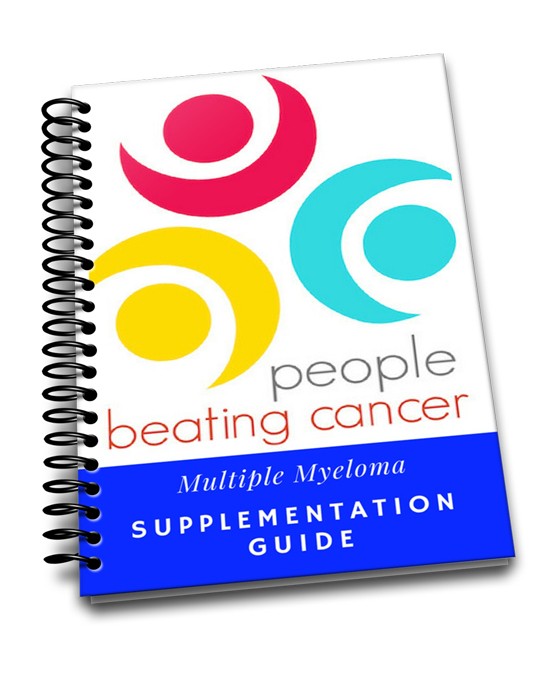
Recently Diagnosed or Relapsed? Stop Looking For a Miracle Cure, and Use Evidence-Based Therapies To Enhance Your Treatment and Prolong Your Remission
Multiple Myeloma an incurable disease, but I have spent the last 25 years in remission using a blend of conventional oncology and evidence-based nutrition, supplementation, and lifestyle therapies from peer-reviewed studies that your oncologist probably hasn't told you about.
Click the orange button to the right to learn more about what you can start doing today.
- You are here:
- Home »
- Blog »
- Multiple Myeloma »
- Multiple Myeloma Therapy- Celastrol/Thunder God Root-
Multiple Myeloma Therapy- Celastrol/Thunder God Root-

“our results reveal the effects of celastrol on proteasome activity in Multiple Myeloma cells and shed light on the underlying mechanisms of its anticancer activity…”
Where is it written that multiple myeloma therapy must be FDA approved and toxic? To put it another way, if you have been diagnosed with multiple myeloma, would you consider low-dose maintenance therapy called celastrol, curcumin, resveratrol, EGCG, or any of the other dozen or so non-toxic MM therapies shown to be cytotoxic to MM?
I an not casting aspersions on the purpose of the FDA when it comes to multiple myeloma. I believe there is a place and a time for both conventional MM oncology and for FDA approved MM therapies.
However, even your oncologist will admit that standard-of-care MM therapies such as
- Revlimid,
- Velcade,
- Cytoxan,
- Kyprolis and others,
cause a host of short, long-term and late stage side effects. More importantly, your oncologist will admit that all MM survivors will eventually develop multi-drug resistance (MDR) and all conventional therapies will stop controlling your multiple myeloma.
Celastrol aka Thunder God Root is one of more than 18 evidence-based but non-conventional MM therapies that are cytotoxic to MM cells. Please understand that the majority of studies that I’ve read regarding these non-toxic MM therapies are either in-vivo or in-vitro- meaning they are either test tube or animal studies.
No for-profit company that I know of will spend the money to conduct human trials for MM therapies that cannot be patented.
When it comes right down to it, all MM patients and survivors must make their own decisions about which MM therapies they take. There are pros and cons, risks and rewards that come from all MM therapies. When I coach MM patients, I spend a lot of time citing what I do and have done regarding my own MM journey since my diagnosis in early 1994.
My point is that each MM survivor can be advised all manner of opinions. But when it comes right down to it, each MM patient must make his or her own decisions. Consider evidence-based, non-conventional therapies.
Have you been diagnosed with multiple myeloma? Scroll down the page, post a question or comment and I will reply to you ASAP.
Hang in there,
David Emerson
- MM Survivor
- MM Coach
- Director PeopleBeatingCancer
Recommended Reading-
- Myeloma Survival- Low-dose Maintenance Therapy
- Can Multiple Myeloma Survivors Drink Red Wine???
- Cannabidiol Kills Multiple Myeloma, Enhances Chemo
Celastrol induce apoptosis of human multiple myeloma cells involving inhibition of proteasome activity.
“Celastrol exhibits anticancer activity and has a number of potential molecular targets. Among them, the proteasome has attracted particular attention.
Although celastrol inhibits multiple myeloma (MM) cell proliferation, the induction of proteasome-inhibitory activity by celastrol in MM cells at the cellular level and in tumors of mice bearing xenografts has not been confirmed.
In the present study, we found that celastrol inhibited the caspase-like (β1), trypsin-like (β2) and chymotrypsin-like (β5) proteasome activities of purified human 20S proteasomes, with half-maximal inhibitory concentration (IC50) values of 7.1, 6.3, and 9.3 μmol/L, respectively.
Celastrol also inhibited human MM cellular β1, β2, and β5 proteasome activities, with IC50 values of 2.3, 2.1, and 0.9 μmol/L, respectively. After MM cells were treated with celastrol, a population of apoptotic cells and a population of cells in G0/G1 were observed. Celastrol also inhibited proteasome activity and induced apoptosis in tumor tissue. Treatment of MM.1S and RPMI 8226 tumor-bearing severe combined immunodeficiency (SCID) mice with celastrol reduced the tumor volume.
In conclusion, our results reveal the effects of celastrol on proteasome activity in MM cells and shed light on the underlying mechanisms of its anticancer activity, providing a basis for developing celastrol as a potential therapeutic agent for MM.”


